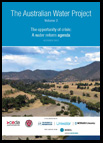Explore our Progress 2050 Goal Tracker
30/09/2012
 |
|
 |
|
 |
Calls for a full review of the food supply chain for irrigated agriculture, to ensure Australia can take advantage of increasing international food demand, is one of the key recommendations in a CEDA report being released today.
CEDA Chief Executive, Professor the Hon Stephen Martin said the final installment in CEDA's Australian Water Project, The opportunity of crisis: A water reform agenda, includes key recommendations around agricultural, environmental and urban water use.
"This project is a joint collaboration between CEDA, Harvard University and Uniwater (a joint venture between the University of Melbourne and Monash University) and this report provides recommendations for government to ensure more efficient and productive water use," he said.
"We are now in a period of relative water abundance and this is the perfect time to review the lessons of the recent extended drought, identify policy failures and implement water policy reform before the next drought begins."
Joint editor of the report and Uniwater, Director, Professor John Langford said increasing food demand from emerging economies in Asia presented significant export opportunities for Australia.
"That is why a key recommendation of the report is a full review of the food supply chain, from international markets back to water supply for crops. This review should include stress testing, by increasing demand and reducing water availability, and examining trade policies, transport, storage and water infrastructure to identify and remedy blockages and constraints," he said.
Professor Langford said the report also makes a number of recommendations around water management in the Murray-Darling Basin.
"More funding is needed for monitoring and evaluation of environmental water allocations to the Murray-Darling Basin to measure the condition and response of ecosystems," he said.
"A stronger scientific understanding would provide the ability to adaptively manage environmental water allocations and provide a stronger base for policy makers for future adjustments.
"Another key recommendation is that more flexible water delivery for irrigators and environmental water holders is needed which would allow water to be delivered on demand, for example timed for crops to ensure optimum growth.
"River operators should provide a menu of choice for irrigators and environmental water holders, for example, when, where, how much and at what flow rate, allowing more productive and innovative use of water."
In addition Professor Langford said the report recommends enabling counter-cyclical trade in environmental water holdings.
On urban water, Professor Langford said the insurance premium that has historically been embodied in physical water infrastructure should be quantified to guide future augmentation and pricing decisions and the report includes a possible model for calculating this insurance premium.
"This would allow the value of different water sources to be better priced," he said.
"Previously all urban water customers received the same reliability of supply. However, if the insurance premium could be calculated customers could be offered for example a lower insurance premium - and lower water prices - for accepting water restrictions earlier or alternatively, pay a high premium and delay having water restrictions applied," he said.
The opportunity of crisis: A water reform agenda will be launched at an event in Melbourne on 17 October at 11:30am.
The release of this report follows a draft discussion paper released in November 2011 Crisis and opportunity: Lessons of Australian water reform and the recent release of three additional chapters.
